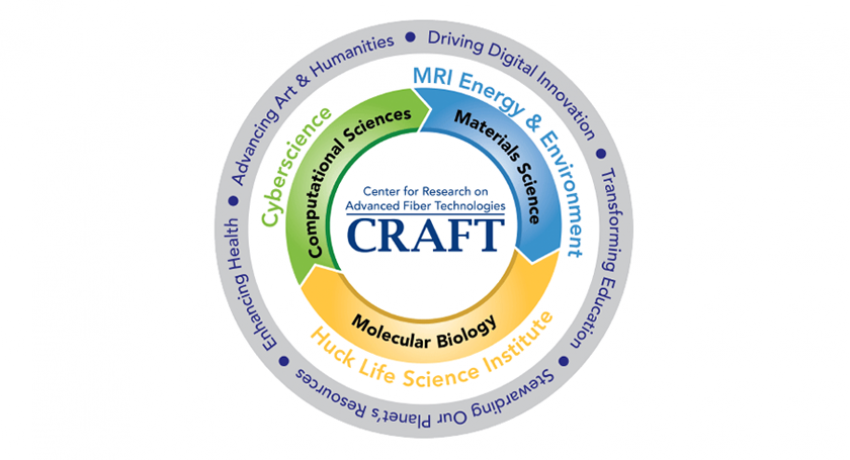Center for Research on Advanced Fiber Technologies
The textile industry in the US is making a comeback after a decades-long slump. Crucial to the resurgence of textile manufacturing in America is investment in advanced fiber technologies that add value to traditional textiles. The new Center for Research on Advanced Fiber Technologies (CRAFT) at Penn State’s Materials Research Institute is applying the expertise of materials scientists, molecular biologists, and electrical and computational engineers, in collaboration with artists and designers, to develop a textile industry that is competitive with the rest of the world, based on new functionalities in fibers.
“CRAFT is about the next generation in textiles and devices,” said center director Melik Demirel, Penn State professor of engineering science and mechanics, introducing the new center at the Programmable and Wearable Molecular Composites Workshop on March 21 in State College. “We are at 26 faculty and growing at Penn State, from 15 different departments.”
CRAFT is part of AFFOA, Advanced Functional Fabrics of America, one of the 14 Manufacturing USA consortia. AFFOA’s strategy is to “create a national network of ‘advanced fabric’ startup incubators and connect them with market facing companies to enable exciting product ideas to emerge across the country.” CRAFT is partnering with two other Pennsylvania universities, Drexel and Carnegie Mellon, to bring an AFFOA Fabric Discovery Center to the commonwealth. Drexel is the lead university.
CRAFT affiliates include a diverse range of manufacturers, including chemical, clothing, automobile and furniture companies, two dozen universities and numerous small technology companies and nonprofit organizations.
Among the research areas already being pursued by CRAFT faculty: wearable textile devices and tattoos, 3D printable fibers, programmable fibers with embedded electronics, metamaterials-based fibers for cloaking and camouflage, self-healing and self-cleaning bio-inspired fibers, and medical fibers for controlled drug delivery, tissue repair, and wound care.
The initial CRAFT workshop drew interest from industry as well as faculty from other universities. In all, 65-75 attendees registered for the two-day meeting to hear talks from clothing designers, physicists and engineers, and a roundtable discussion featuring university, government and industry representatives. Topics ranged from wearable design to shape memory fabrics to atomically thin coatings. As Genevieve Dion, a clothing designer and associate professor from Drexel, told the audience, “Functional textiles are said to be the most transdisciplinary research area of our time.”
Penn State’s CRAFT will complement Drexel’s long-standing textile program with Penn State’s strength in materials science and engineering to take advantage of a manufacturing sector that is poised to grow, according to AFFOA, by $50 billion over the next 10 years.
Visit the CRAFT website to see how CRAFT technologies can advance innovative textile products for your company.

